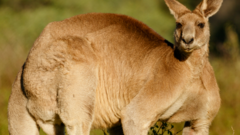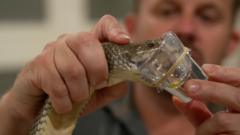Australia’s Prime Minister Anthony Albanese confirmed the return of Si Yi Chen, Michael Czugaj, Matthew Norman, Scott Rush, and Martin Stephens, marking a significant moment in a case that attracted global attention and scrutiny over Indonesia's harsh drug laws.
Bali Nine Drug Smugglers Repatriated to Australia After Two Decades

Bali Nine Drug Smugglers Repatriated to Australia After Two Decades
Five members of the notorious "Bali Nine" drug trafficking ring return home after nearly 20 years in Indonesian prisons.
The notorious Bali Nine drug ring has seen its five remaining members return to Australia after spending nearly two decades in Indonesian prisons. Prime Minister Anthony Albanese announced on social media that the men, Si Yi Chen, Michael Czugaj, Matthew Norman, Scott Rush, and Martin Stephens, arrived back in Australia on Thursday afternoon. Albanese extended his gratitude to Indonesia’s President Prabowo Subianto for his act of compassion toward the repatriation.
The saga of the Bali Nine began in 2005 when nine young Australians were apprehended in Bali while attempting to smuggle 8.3 kilograms (approximately 18 pounds) of heroin. The case turned sensational when two of the ringleaders, Andrew Chan and Myuran Sukumaran, faced execution by firing squad in 2015, which led to a strained diplomatic relationship between Australia and Indonesia. The remaining members received long prison sentences, with some serving decades behind bars, drawing global commentary on Indonesia's strict drug enforcement policies.
The Bali Nine case became a focal point for discussions around harsh drug sentences in Indonesia, which is among the most stringent in the world. The plight of the group highlighted the complexities of international drug laws and their enforcement, as well as the broader implications for foreign nationals caught in similar situations.
Following the repatriation of the five men, Australia's government emphasized the importance of rehabilitation and reintegration into society. While it remains unclear whether they will have to continue serving their sentences in Australia, the Australian government expressed gratitude to Indonesia for facilitating their return on humanitarian grounds.
The saga of the Bali Nine began in 2005 when nine young Australians were apprehended in Bali while attempting to smuggle 8.3 kilograms (approximately 18 pounds) of heroin. The case turned sensational when two of the ringleaders, Andrew Chan and Myuran Sukumaran, faced execution by firing squad in 2015, which led to a strained diplomatic relationship between Australia and Indonesia. The remaining members received long prison sentences, with some serving decades behind bars, drawing global commentary on Indonesia's strict drug enforcement policies.
The Bali Nine case became a focal point for discussions around harsh drug sentences in Indonesia, which is among the most stringent in the world. The plight of the group highlighted the complexities of international drug laws and their enforcement, as well as the broader implications for foreign nationals caught in similar situations.
Following the repatriation of the five men, Australia's government emphasized the importance of rehabilitation and reintegration into society. While it remains unclear whether they will have to continue serving their sentences in Australia, the Australian government expressed gratitude to Indonesia for facilitating their return on humanitarian grounds.




















